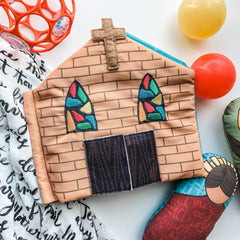The Bible is at the center of our faith, offering guidance, wisdom, and hope in every part of life. So, how many books are in the Bible? In the Catholic tradition, the Bible contains 73 books, with 46 in the Old Testament and 27 in the New Testament. This collection includes writings known as the Deuterocanonical books, which are treasured for their history, prayers, and lessons about God's faithfulness.
In this article, we'll explore how the Old Testament and the New Testament are arranged, why the Catholic Bible contains more books than some other Christian Bibles, and how these writings, passed down through centuries, came together into one complete collection.
Our hope is that you'll come away with both a clear understanding of the structure of the Catholic Bible and a deeper appreciation for the richness of God's Word.
What this article covers:
- How Many Books Are in the Bible?
- What Are the Old Testament Books?
- What Are the New Testament Books?
- How and When Was the Bible Compiled into One Book?
- How Many Books Are in the Bible (FAQs)
How Many Books Are in the Bible?
The Catholic Bible contains 73 books, made up of 46 in the Old Testament and 27 in the New Testament. That's the version used by Catholics around the world in Mass, personal study, and prayer.
Within those 73 books are the Deuterocanonical writings, such as Tobit, Judith, and the books of Maccabees, which aren't found in Protestant Bibles but are an important and valued part of Catholic Scripture.
Other Christian traditions, like many Protestant denominations, recognize a total of 66 books instead. These differences reflect the way early communities of faith recognized and preserved Scripture.
What Are the Old Testament Books?
The Catholic Old Testament contains 46 books. These are grouped into the Law, the Historical Books, the Wisdom Books, and the Prophets. Each section tells part of the story of God's people and His covenant of love:
The Law (Pentateuch)
- Genesis: Creation, the patriarchs, and God's covenant with Abraham.
- Exodus: God delivers Israel from Egypt and gives the Ten Commandments.
- Leviticus: Laws for worship, sacrifice, and holy living.
- Numbers: Israel's wanderings in the desert and God's faithful care.
- Deuteronomy: Moses' final speeches and a call to remain faithful.
The Historical Books
- Joshua: Entry into the Promised Land.
- Judges: Leaders raised up in times of struggle.
- Ruth: A story of loyalty and redemption.
- 1 Samuel: Samuel, Saul, and the rise of David.
- 2 Samuel: David's reign as king.
- 1 Kings: Solomon's wisdom, the temple, and division in the kingdom.
- 2 Kings: The fall of Israel and Judah, leading to exile.
- 1 Chronicles: A retelling of David's story with a focus on worship.
- 2 Chronicles: The kings of Judah and the importance of the temple.
- Ezra: The return from exile and the rebuilding of the temple.
- Nehemiah: Rebuilding Jerusalem's walls and renewing the covenant.
- Tobit: A tale of family, faith, and God's guidance.
- Judith: The courage of a woman who saves her people.
- Esther: A queen's bravery in protecting Israel.
- 1 Maccabees: The story of Jewish resistance and faithfulness.
- 2 Maccabees: Miracles, martyrdom, and hope in God's promises.
The Wisdom Books
- Job: Wrestling with suffering and God's justice.
- Psalms: Songs and prayers of praise, lament, and trust.
- Proverbs: Wise sayings for godly living.
- Ecclesiastes: Reflections on the meaning of life.
- Song of Songs: A poetic celebration of love.
- Wisdom: Teachings on righteousness and immortality.
- Sirach (Ecclesiasticus): Practical wisdom for everyday faith.

The Prophets
- Isaiah: Powerful prophecies of judgment and hope.
- Jeremiah: A call to repentance and trust in God.
- Lamentations: Poetic sorrow over the fall of Jerusalem.
- Baruch: Reminders of God's law and promises.
- Ezekiel: Visions of God's glory and restoration.
- Daniel: Stories of faith in exile and visions of the future.
- Hosea: God's love for His unfaithful people.
- Joel: A call to repentance and the promise of God's Spirit.
- Amos: A plea for justice and righteousness.
- Obadiah: God's judgment on Edom.
- Jonah: God's mercy toward Nineveh.
- Micah: Justice, mercy, and the promise of a Savior.
- Nahum: The fall of Nineveh foretold.
- Habakkuk: Faith in the face of questions.
- Zephaniah: Warnings of judgment and hope for restoration.
- Haggai: Encouragement to rebuild the temple.
- Zechariah: Visions of renewal and God's future kingdom.
- Malachi: A call to faithfulness and preparation for the Lord.
What Are the New Testament Books?
The Catholic New Testament contains 27 books. These are grouped into the Gospels, which are some of the best books to read in the Bible as a beginner, the Acts of the Apostles, the Epistles, and Revelation:
The Gospels
- Matthew: Jesus as the promised Messiah.
- Mark: A fast-moving account of Jesus' ministry.
- Luke: A detailed story of Jesus' compassion and mission.
- John: A theological portrait of Jesus as the Son of God.
History
- Acts of the Apostles: The birth of the Church and the spread of the Gospel.

The Pauline Epistles
- Romans: Paul explains salvation through faith.
- 1 Corinthians: Guidance for a struggling church.
- 2 Corinthians: Paul's encouragement and defense of his ministry.
- Galatians: Freedom in Christ apart from the law.
- Ephesians: The unity of the Church in Christ.
- Philippians: Joy in the Christian life.
- Colossians: Christ's supremacy and our new life in Him.
- 1 Thessalonians: Hope in Christ's return.
- 2 Thessalonians: Clarifying misunderstandings about the end times.
- 1 Timothy: Instructions for church leadership.
- 2 Timothy: Paul's final encouragement to remain faithful.
- Titus: Guidance for leaders in the Church.
- Philemon: A personal letter urging forgiveness and reconciliation.
The Catholic Epistles
- Hebrews: Christ as the perfect high priest.
- James: Faith expressed through good works.
- 1 Peter: Hope for believers facing trials.
- 2 Peter: Warnings against false teachers.
- 1 John: Love as the mark of true faith.
- 2 John: A brief letter about truth and love.
- 3 John: Support for faithful leaders.
- Jude: A call to stand firm in the faith.
Prophecy
- Revelation: Visions of Christ's victory and the new creation.
How and When Was the Bible Compiled into One Book?
In the early centuries, Scripture wasn't a single bound book on a shelf. It was a collection of scrolls and letters that were read in Jewish synagogues and, later, in Christian communities.
The Old Testament books, including the Deuterocanonical writings, were already part of the Greek translation of Scripture known as the Septuagint, which was widely used at the time of Jesus and the apostles. The New Testament writings began to circulate after the Resurrection, with letters from Paul passed from one church to another and the Gospels carefully preserved.
By the 4th century, Church leaders recognized the full canon of 73 books we know today in the Catholic Bible.
Centuries later, the invention of the printing press changed everything. The Gutenberg Bible in the 1450s made it possible for Scripture to be copied more quickly, shared more widely, and treasured in homes as well as churches.
What began as scattered scrolls slowly became the unified, complete Bible with all of the best books in the Bible that Catholics read and cherish today. And for those who want to keep God's Word close in daily life, scripture gifts with favorite verses can be a beautiful reminder of the same truths passed down through centuries.

Conclusion
The Catholic Bible contains 73 books, 46 in the Old Testament and 27 in the New Testament, and each one plays a part in telling the story of God's love and faithfulness. We've seen how these writings were preserved, recognized, and brought together into the complete collection used in the Church today.
Understanding the structure of the Bible helps us appreciate both its depth and its unity, from the Law and the Prophets to the Gospels and the Epistles.
If you're looking for a meaningful way to keep Scripture close in your daily life, explore the Bible verse gifts available at The Little Rose Shop's catholic store and find something that speaks to your heart.
How Many Books Are in the Bible (FAQs)
What are the Deuterocanonical books in the Catholic Bible?
The Deuterocanonical books are seven Old Testament writings included in the Catholic Bible but not in most Protestant Bibles. They are Tobit, Judith, Wisdom, Sirach, Baruch, and 1 and 2 Maccabees.
How can I start reading the Bible if it feels overwhelming?
Many people find that the best places to start are the Gospels to learn about the life of Jesus. Others enjoy starting with Psalms or Proverbs for daily encouragement. The key is to begin with a few verses each day and let the rhythm of Scripture become part of your routine.
What does the Bible say about spiritual gifts?
The Bible teaches that the Holy Spirit gives different gifts to believers for the good of the Church.
But what are the spiritual gifts in the Bible? They include wisdom, knowledge, faith, healing, teaching, and others. You can read about them in passages like 1 Corinthians 12 and Romans 12. Each gift is meant to serve others and build up the Body of Christ.



